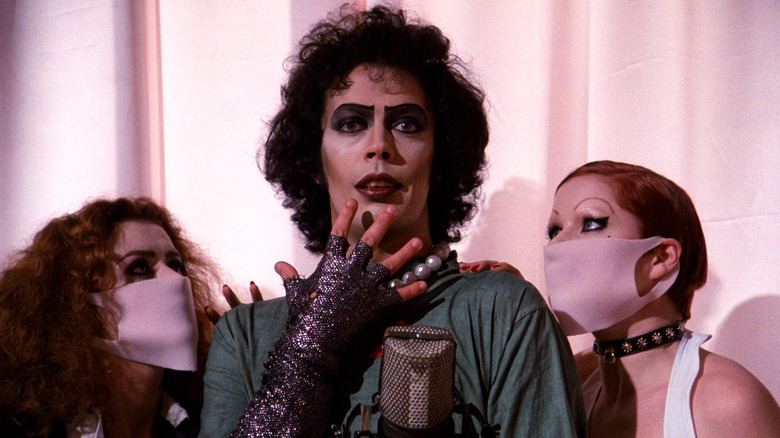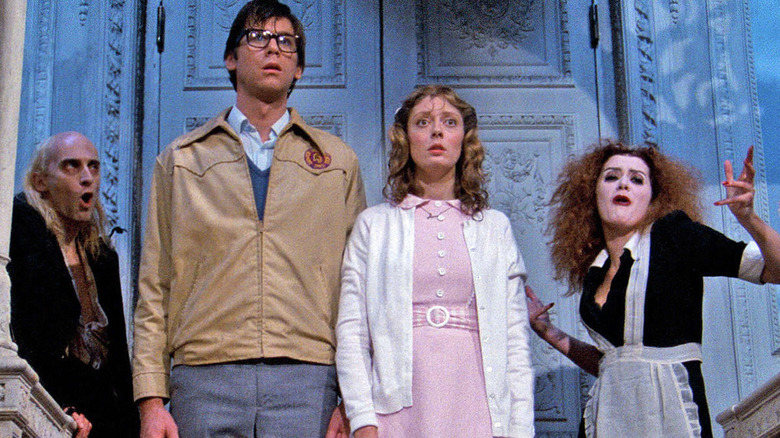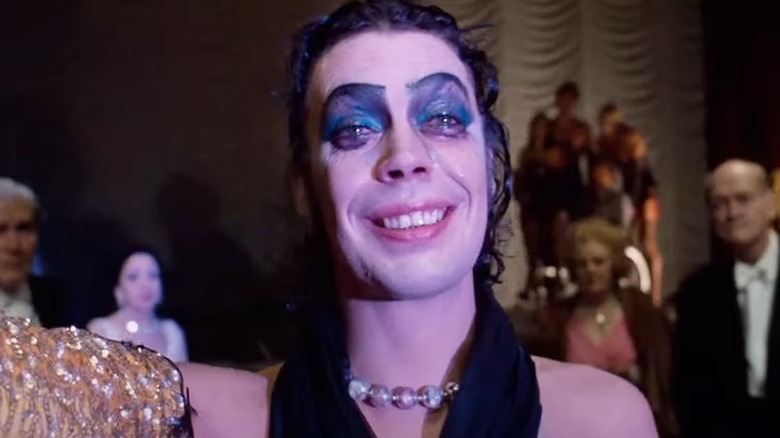50 Years Later, The Rocky Horror Picture Show Remains The Perfect Cinematic Sanctuary For Freaks
Since the late '70s, something strange and spectacular has happened in darkened theaters across the globe. As the clock strikes midnight, fishnet-clad fanatics gather like gothic disciples for a ritual unlike any other; part musical, part movie, part mass seduction. We don't just watch "The Rocky Horror Picture Show" — we become it. Richard O'Brien and Jim Sharman's adaptation of the hit stage production "The Rocky Horror Show" is the alpha and omega of cult cinema, resurrected from the depths of a flopped box office to become the midnight movie to rule them all.
Spurred on by a devoted, rowdy audience who refused to let it die, "Rocky Horror" now holds the Guinness title for the longest continuous theatrical run. O'Brien's original stage production in London was already breaking the rules of good taste and entertainment. Shows became parties where the fourth wall never stood a chance, and the audience participation baked into the show's legacy carried over to the midnight movie scene.
An audience member named Michael Wolfson first transformed himself into Dr. Frank-N-Furter in 1975 and went on to form the very first organized shadow cast, or a group of costumed performers who perform and lip-sync the events of the movie in front of the screen. Thus, a worldwide phenomenon was born. A theatrical oddity motivating viewers "don't dream it, be it" has since become a sacred, sequined tradition for half a century. Week after week, decade after decade, audiences keep returning — rolls of Scott toilet paper in hand, toast in pocket — to yell, dance, and worship at the altar of this gloriously unhinged masterpiece, kept alive by passionate fans — folks like the late, great, Sal Piro.
But "The Rocky Horror Picture Show" is not just a movie; it's a sanctuary. The hallowed theaters are more than just homes for confetti, rice, and group renditions of "The Time Warp." They've also historically served as one of the few places where outsiders, queer people, and anyone who has ever been made to feel like an unconventional conventionist can find solace.
The congregation of The Rocky Horror Picture Show
The first time I saw "The Rocky Horror Picture Show" at a midnight screening, I was a high school student who broke curfew and drove an hour to Milwaukee's Oriental Theatre — home to the world's longest-running "Rocky Horror showings." The audience was multigenerational. An older gay couple flagged down the cast member dressed as Magenta to mark their niece with a red lipstick "V" for "virgin." A trans woman, quiet and reserved in line, shed her coat and transformed the moment she entered the theater. A young Trixie Mattel — long before she was famous — floated through the crowd before performing "Science Fiction, Double Feature." This was the mid-2000s: pre-marriage equality, in a state with no statewide LGBTQIA+ anti-discrimination laws. And yet, inside that theater, people were free; wild, weird, and without any fear of being themselves.
"Rocky Horror" isn't just a cult film; it's a cultural touchstone. With its core themes of isolation, sexual exploration, and subversion of the status quo, midnight screenings evolved into sanctuaries for LGBTQIA+ people — especially the gender-nonconforming — offering rare spaces for expression without judgment or legal risk. These spaces still matter: more than half of the U.S. still lacks statewide protections for LGBTQIA+ individuals.
Crucially, it's also an accessible refuge. A cheap ticket and a midnight start made it available to working-class queer folks. And unlike bars or nightclubs, those under 21 could attend, giving queer teens a rare, real-life community space. The shows were also one of the few places where straight, cisgender people willingly and joyfully stepped into queer culture — singing, shouting, dressing up, and connecting. For many of us, "Rocky Horror" isn't just a movie. It was a rite of passage. A lifeline. A loud, campy growl of Tim Curry's seductive baritone voice telling us that being a wild and untamed thing is a good thing.
I've since gone on to host screenings of my own, join shadowcasts, and perform in the stage production multiple times over the last 20 years. To say the film had an impact on me is an understatement.
Rocky Horror remains immortal
When "The Rocky Horror Picture Show" first hit theaters 50 years ago, it was only a few years removed from the Stonewall Riots. The 1970s were a coming of age for the civil rights movement of the LGBTQIA+ community. By openly displaying sex, sexual humor, and LGBTQIA+ representation, "RHPS" sent a surge of liberation through the 1970s that continues to reverberate, inspiring LGBTQIA+ people to this day. Half a century later, yes, we've got Pride parades and corporate allyship, but let's not get cute, anti-queer legislation is back with a vengeance, and liberation might as well be as far away as the land of Transsexual in the galaxy Transylvania. "Don't Say Gay" bills are still permeating American legislation, and the Trump administration is attacking the transgender community with hateful executive orders and the erasure of LGBTQIA+ history from government resources. We're still fighting for space — to exist, to be seen, to live without trepidation. That's why "Rocky Horror" still matters. It's a gathering point for the beautiful, the freaky, the rejected, and the fabulous.
Forget the debates about whether it's "problematic." Rocky doesn't apologize — and neither should we. "Rocky Horror" was a revelation, teaching generations that queerness doesn't have to be palatable; it just has to be yours. Authenticity isn't a luxury; it's a lifeline. When you stop catering to others and start living for yourself, that's when real connection begins. And in a world growing colder to self-expression — where drag is demonized and transness is legislated — blending in won't save us. Assimilation breeds silence, and silence is deadly. But together, in those theaters, singing and screaming our hearts out ... they'll need a laser gun capable of emitting a beam of pure antimatter to stop us. There's always a light on over at the Frankenstein place, ready and willing to take us on a strange journey to "The Rocky Horror Picture Show."


